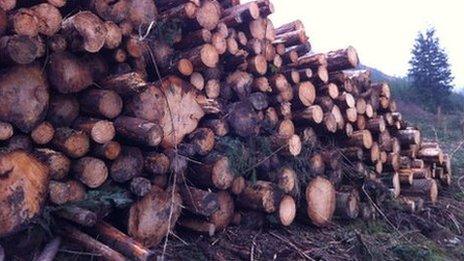Natural Resources Wales: Forestry concern as name unveiled
- Published

Forestry companies have already voiced fears about the environmental bodies merger
There is concern that the views of the forestry industry will not be reflected by a new organisation managing Wales' natural resources.
The chairman of the Forestry Commission in Wales said he was disappointed by the membership of the new board.
The Welsh government has now announced that the name of the new organisation will be Natural Resources Wales.
It said board members were selected on merit and in line with the public appointments process.
The Welsh government also said that it would ensure it responded to different sectors' needs.
The organisation is being created by a merger of the Forestry Commission, Environment Agency and the Countryside Council for Wales.
Ministers say replacing the three organisations with a single body will save the taxpayer £158m over 10 years.
But Jon Owen Jones, the chairman of the Forestry Commission in Wales, said: "I am disappointed that those of us in the Forestry Commission that have been raising this concern of forestry don't appear to have any representation on the board.
"We have been making the case that the business case for the FC's inclusion (in the merger) is thin and it's dependent on a number of fairly optimistic assessments of what will happen."
Mr Jones, a former Labour MP, said there was commercial expertise in the Forestry Commission "and that's a different role to the largely regulatory role of the two other organisations".
"We were concerned that role would be rather swamped in the new organisation," he added.
'Value for money'
Environment Minister John Griffiths said the organisation's name - Cyfoeth Naturiol Cymru in Welsh - "communicates well the remit of the new body".
He said: "Not only will the new body result in a more streamlined way of working for the benefit of its customers, it will also ensure more effective delivery, improved value for money and better outcomes for the people of Wales."
A report by the assembly's environment and sustainability committee earlier this year warned the "commercial acumen" of the Forestry Commission must not be lost.
In May Mr Griffiths told AMs that he would be "keen to ensure that there is adequate representation of forestry on the board".
But opposition parties said the body's 10 non-executive directors lacked expertise in the forestry sector.
Welsh Conservative rural affairs spokeswoman Antoinette Sandbach said: "The forestry industry had serious concerns that it would be neglected in the merged body, and it is worrying that expertise in this vital industry is under-represented on the board of directors."
Liberal Democrat environment spokesman William Powell said: "Assurances were given by the environment minister that the forestry sector would be adequately represented however it is clear looking at the membership of the board that there isn't enough forestry experience and knowledge. This is not good enough."
The board includes Harry Legge-Bourke, a partner in the family-run Glanusk Estate in Powys which has a forestry operation on its land.
Another non-executive director, Nigel Reader, acted as a consultant to the Welsh government and reviewed its business case for the single environment body.
A Welsh government spokeswoman said board members, chosen from 185 candidates, were selected in line with the public appointments process.
"This means they were selected on merit and not because of the sectors they represented," she said.
"The board is keen to build strong relationships with all interested parties."
She said it would "establish mechanisms" to make sure it responded to the needs of different sectors.
Responding to Mr Reader's appointment, she said: "Many people from the three bodies and beyond fed into the business case for Natural Resources Wales.
"We do not believe it was necessary or appropriate to rule people out because they had a role in producing or assessing the business case."
The Tories also questioned the cost of the merger after answers from Mr Griffiths showed more than £730,000 had so far been spent on "IT infrastructure scoping" and more than £30,000 on branding, marketing and communication.
The government said it was investing to make sure the IT system would be reliable and fit for purpose so the organisation can hit the ground running when it starts work next April with a staff of some 1,900 people and a budget of around £160m.
- Published6 October 2012
- Published1 August 2012
- Published22 May 2012
- Published27 April 2012
- Published29 November 2011
- Published25 November 2011